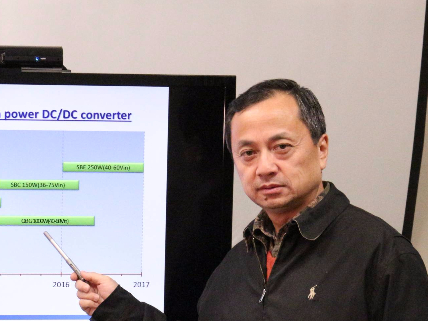What's the difference between Power Supply and Converter?
What's the difference between Power Supply and Converter?
Can someone help this question?Thanks in advance!!!!!!
Comments: 7
-
 louis.xi
louis.xiA power supply is an electrical device that supplies electric power to an electrical load. The primary function of a power supply is to convert electric current from a source to the correct voltage, current, and frequency to power the load. As a result, power supplies are sometimes referred to as electric power converters. Some power supplies are separate standalone pieces of equipment, while others are built into the load appliances that they power. Examples of the latter include power supplies found in desktop computers and consumer electronics devices. Other functions that power supplies may perform include limiting the current drawn by the load to safe levels, shutting off the current in the event of an electrical fault, power conditioning to prevent electronic noise or voltage surges on the input from reaching the load, power-factor correction, and storing energy so it can continue to power the load in the event of a temporary interruption in the source power (uninterruptible power supply). All power supplies have a power input connection, which receives energy in the form of electric current from a source, and one or more power output connections that deliver current to the load. The source power may come from the electric power grid, such as an electrical outlet, energy storage devices such as batteries or fuel cells, generators or alternators, solar power converters, or another power supply. The input and output are usually hardwired circuit connections, though some power supplies employ wireless energy transfer to power their loads without wired connections. Some power supplies have other types of inputs and outputs as well, for functions such as external monitoring and control. see details, you can open:https://en.wikipedia.org/wiki/Power_supply
5Reply -
 louis.xi
louis.xiIn electrical engineering, power engineering, and the electric power industry, power conversion is converting electric energy from one form to another such as converting between AC and DC; or changing the voltage or frequency; or some combination of these. A power converter is an electrical or electro-mechanical device for converting electrical energy. This could be as simple as a transformer to change the voltage of AC power, but also includes far more complex systems. The term can also refer to a class of electrical machinery that is used to convert one frequency of alternating current into another frequency. Power conversion systems often incorporate redundancy and voltage regulation. One way of classifying power conversion systems is according to whether the input and output are alternating current (AC) or direct current (DC). see details,you can open:https://en.wikipedia.org/wiki/Electric_power_conversion
5Reply -
 mrpower
mrpowerThis is a very good question raised by Jasmine. Upon seeing this question, I also checked the wikipedia definitions that Louis posted. These definitions do not address the differences between these two and the question is still unanswered. Frankly I am often confused of which one to use when writing an article or a product release. There isn't a clear line existing between these two terminologies, but there're conventions that people tend to go by and the kind of "feel" we should try to get. Feel free to share your thoughts. I will share mine when I have time to think it over. Good question!
4Reply -
 mrpower
mrpower"power supply" sounds to be a more general and broad term, while "converter" sounds more technical and specific..... Any street people probably understands what a power supply is, while has no idea of what a converter means if you don't further explain. In the technical world, they are often mix used, but there're grey differences in technical people's minds...... This is an interesting subject.
3Reply -
 mrpower
mrpowerPower Supply vs. Power Converter These two phrases fundamentally talk about the same thing – a product that takes one form of electricity (voltage, current and frequency) and convert it to another form to meet the needs of loads. There is no simple and clear definition on when to use which. However, this is a question professionals in the power conversion field should have a sense about so that the proper phrase is used. This article provides a rough guide that is certainly debatable, but at least shad some lights on this confusing subject. Remember, one can always find exceptions of the below categorization, which is no surprise and should not be used for debating. What we are trying to do is to find the most common use of these terms. A power supply, by its name, is quite general. Anything that provides electricity to a load or loads can be called a power supply. In reality, it’s more used to describe equipment or assemblies for AC-to-DC power conversion, either as a standalone equipment such as bench-top laboratory power supplies and rack-mount AC-DC power supplies (also called rectifiers), or as a sub-assemblies inside a system such as PC power supplies that go inside PC boxes. The common characteristics are: 1) ac input; 2) having input and output connectors. Products with these two characteristics are most called power supplies other than a power converter. “Power supply” cannot be used for any board-mount component type of products. Power supply is a general phrase that most people on the street understand. If a power conversion product is made for end-use or for end-users to directly handle, it’s most likely called a power supply not a power converter. These products usually have the above two characteristics. A power converter is a phrase more used for DC-to-DC power conversion products no matter they have connectors or not, and for board-mount AC-to-DC power conversion products (no connectors of course). Examples include board-mount DC-DC or AC-DC power converters (also called modules) which are soldered onto a system PCB and EV on-board DC-DC converters which have both input and output connectors, yet used inside a bigger system (the vehicle). “Power converter” is also used to describe all IC’s based power conversion products. When one sees a semiconductor supplier promotes a power converter, it is usually just about an IC with integrated switches and a few recommended components around it. Be noted that for DC input power conversion products with connectors, they could also be called power supplies. For example, DC input VPX power supplies are a common saying, not VPX power converters. This might be because VPX power conversion products have AC input versions, and people just used the same phrase “power supplies” for both versions. As the battery applications gets more and more popular, it won’t be a surprise that we might see more and more use of the phrase of “power supply” for DC input products, especially large standalone or rack-mount equipment. “Inverter” is the word for DC-to-AC power conversion. The most popular application is UPS and Solar inverters. AC-to-AC application is not frequently encountered. I believe the word “converter” is the right use for it. Again, exceptions exist. Yet if you get the sense of the above, you probably won’t be laughed at.
5Reply -
 Arthur
ArthurFruit is abstract, an apple is concrete. A power coverter is a kind of power supply.
0Reply[michael] Reply: -
 michael
michaelLittle difference.
1Reply
Add a Comment
Please login to comment.Login
Enter your email address and password

